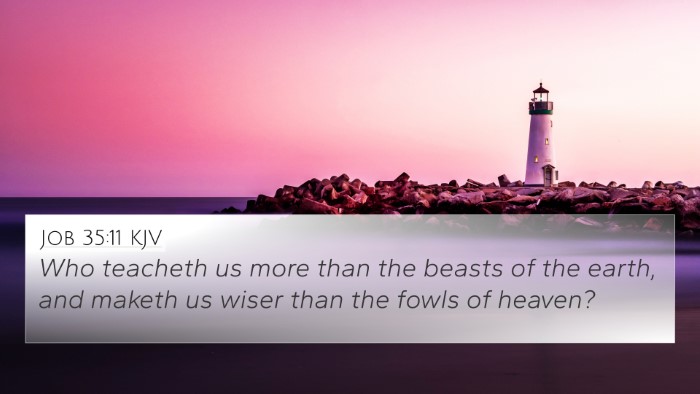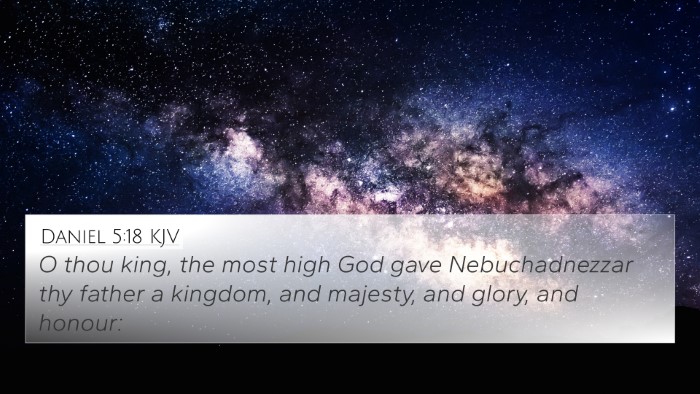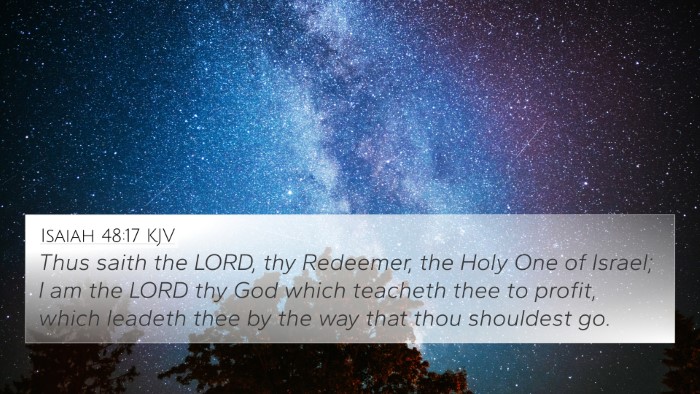Understanding Job 36:22
Job 36:22 states:
"Behold, God is exalted by his power: who teacheth like him?"
This verse encapsulates profound theological insights about God's sovereignty and omnipotence. By examining various public domain commentaries, we can derive a comprehensive understanding of the verse's meaning and its connections to other biblical scriptures.
Insights from Commentaries
Matthew Henry's Commentary
Matthew Henry emphasizes the grandeur of God's power, pointing out that He is the ultimate authority and teacher. The notion of God teaching is critical as it highlights His role in imparting wisdom and understanding to humanity. Henry notes that God's power is not only mesmerizing but instructive, serving as a guide for our lives.
Albert Barnes' Notes
Albert Barnes discusses the context in which Elihu speaks, asserting that his goal is to demonstrate God's magnificence. He elaborates on the idea that no one can teach or instruct God, as His understanding and wisdom are infinitely superior to ours. Barnes also connects this to the broader themes of divine providence and oversight in human affairs.
Adam Clarke's Commentary
Adam Clarke brings attention to the dual aspects of God's character: His power and His role as a teacher. Clarke asserts that God's exaltation is directly linked to His ability to educate and guide creation. This verse, according to Clarke, serves as a call for reverence toward God's wisdom and instruction.
Thematic Connections
Job 36:22 serves as a bridge between various themes within the Bible, particularly regarding God's sovereignty and His role as a teacher. This verse resonates with several other scriptures, illustrating the connections between Bible verses.
Bible Cross References
- Isaiah 40:13-14: "Who hath directed the Spirit of the Lord, or being his counsellor hath taught him?" - This verse also emphasizes God's unmatched wisdom.
- Romans 11:33: "O the depth of the riches both of the wisdom and knowledge of God!" - Highlighting the incomprehensibility of God's wisdom.
- Psalms 147:5: "Great is our Lord, and of great power: his understanding is infinite." - Affirms God's omniscience and power.
- Proverbs 2:6: "For the Lord giveth wisdom: out of his mouth cometh knowledge and understanding." - Illustrates God as the source of true wisdom.
- 1 Corinthians 1:25: "Because the foolishness of God is wiser than men; and the weakness of God is stronger than men." - Connects to the theme of divine wisdom compared to human understanding.
- Job 12:13: "With God is wisdom and strength, he hath counsel and understanding." - Reinforces that all wisdom originates from God.
- Psalm 32:8: "I will instruct thee and teach thee in the way which thou shalt go." - Highlights God's teaching role in guiding believers.
- Matthew 11:29: "Take my yoke upon you, and learn of me; for I am meek and lowly in heart." - Jesus invites us to learn from Him, emphasizing the teaching aspect of divine authority.
- John 13:13: "Ye call me Master and Lord: and ye say well; for so I am." - Affirms Jesus' authority and by extension God's, in teaching humanity.
- James 1:5: "If any of you lack wisdom, let him ask of God, that giveth to all men liberally, and upbraideth not." - Emphasizes that God is eager to impart wisdom to those who seek it.
Comparative Analysis
In a comparative Bible verse analysis, we see that Job 36:22 not only highlights God's power but does so in a way that invites reflection on how other scriptures align with this message. This inter-Biblical dialogue encourages readers to seek out how scriptures are woven together across the Testament, providing a richer understanding of the divine character.
Tools for Bible Cross-Referencing
To deepen one's study of Job 36:22, it is beneficial to use tools for Bible cross-referencing. Some useful resources include:
- Bible concordance
- Bible cross-reference guide
- Cross-reference Bible study aids
- Bible reference resources
Conclusion
Job 36:22 stands as a testament to God's power and wisdom, echoing throughout the scriptures. The connections between Bible verses enrich our understanding of the theological implications and encourage deeper study. By exploring these links and cross-references, we can appreciate the intricate tapestry of God's revealing presence throughout the Bible.


















